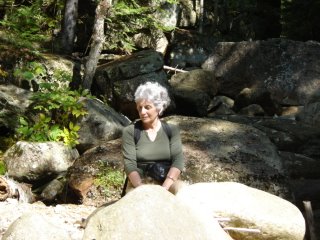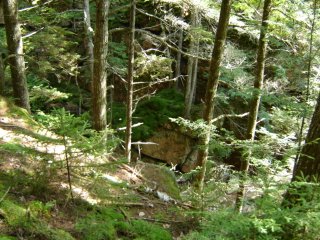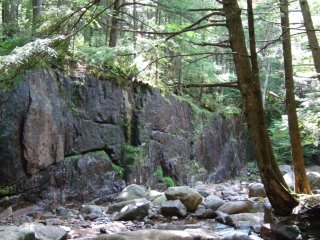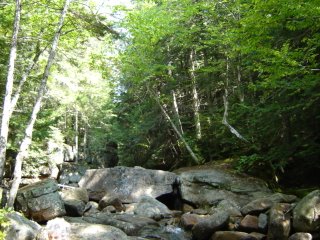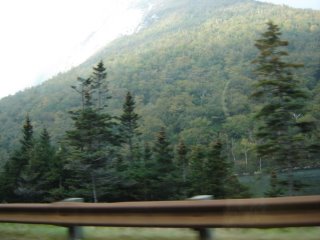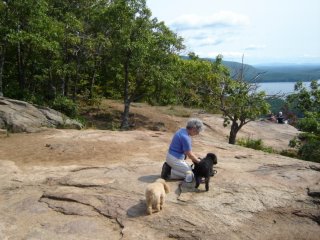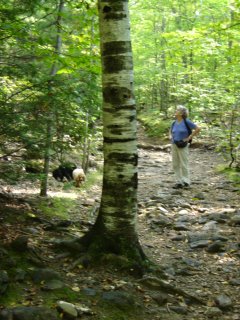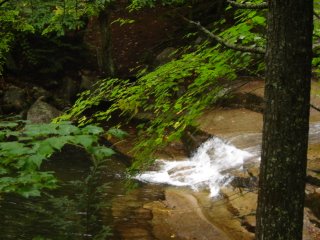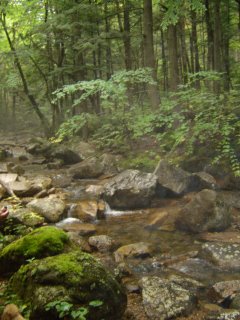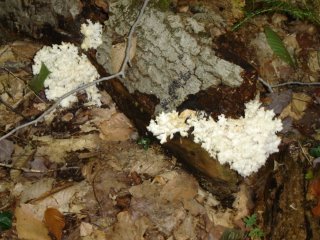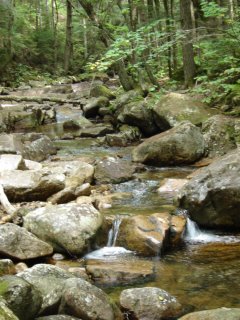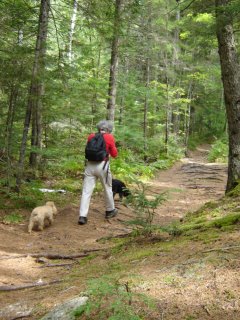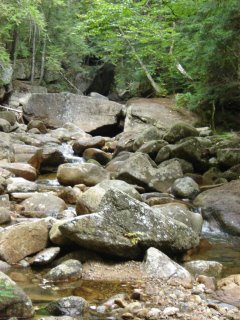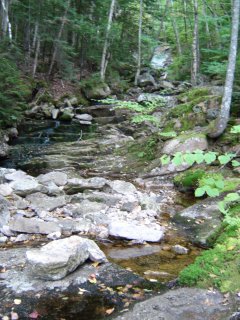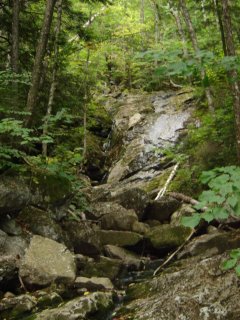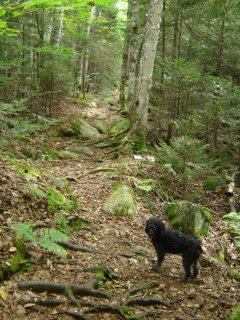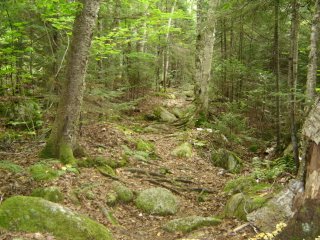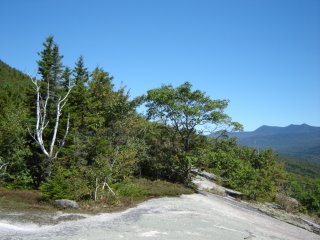Day Eight - 18Sept2006
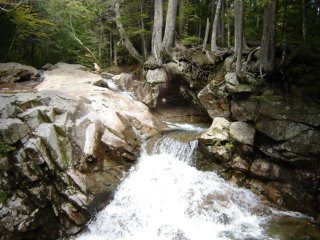
Just on the verge of frost, rooftops moist, early morning fog which a pale sun soon burned away. In the mountains morning dawns later, dark descends earlier; small price to pay for the all-encompassing beauty of the landscape.
It's difficult to motivate Irving to come in from the sun-kissed grassy plaza where he seats himself to "watch that Button and Riley don't get into any trouble", toddling off somewhere on the wooded slope. But he has to shower, present himself for breakfast which I'm preparing while supervising the dogs, ushering them to their own breakfast bowls. I do believe it's these early morning retreats that have spurred him to remain a day past our originally-designated departure.
The views surrounding our perch here, horse meadow complete with placidly-grazing horses. Two Clydesdales, a full herd of riding horses: Palominos, sleek black, pinto, dappled grey - all with proud conformations. Beyond the meadow a long march of deciduous trees, the odd maple already crimson. Unseen beyond the screen of trees, the boulder-tossed Pemigawasset River, and well beyond its banks, wooded foothills and finally, mountain peaks stippling the broad horizon.
Crows coast by on the still air. The occasional vehicle slips by on the road. The newly-reduced brace of chickling guineau fowl meander about, not now in noticeable mourning. Our little dogs take no notice of them any longer.
It's a short-sleeve day, a shorts day, although the sky is steadily becoming beclouded, slight breezes shifting the air. We dally; no hurry, after all. Time is our own, to do with as we will. While cleaning up post-breakfast, I listen to C-span, hear the agonized and agonizing arguments, pro- and con- troop removal from Afghanistan, Iraq, both actively impending catastrophies in the making. Following on the now-perceived catastrophic experiments in human intolerance that they were. Arguments echoed in the Canadian media.
Amerika in crisis. No less perhaps than that of the countries to which its current president has pledged unaccountably, even quixotically, to bring democracy to. As though by sheer force of will, aided and abetted, of course, by military strength, such a concept could be forced upon populations still in thrall to their own ideals of dictatorships be they theistic, secular or monarchic.
Meanwhile - the day's adventure patiently beckons and we are off - none to soon - certainly not too late. We take, this time, the opposite direction, away from the Waterville Valley. A back road, not the main highway - we'll soon have our fill of those. Route 93 parallels the long route of the Pemi. Along the way we catch glimpses of its restive waters coursing around its rocktumbles.
Around the town of Woodstock - yet another town strung out along the road - there are the ever-present gift shops, liquor outlets, bars (but no grocery stores). Motels with cottage extensions and without, clumps of cottages and cabins abound, depressing in their sameness, their bleak appearance, whether mere slatternly shacks or well-maintained temporary abodes.
They appear uniformly deserted. As is the "Christmas House" we pass, the souvenir emporiums, the restored railways offering tourist rides, the huge playground installations boasting numerous wet slides. Empty facades of emptily joyful entertainment. We approach and then pass Indian Head for more of the same. Motels, cottages, cabins, pools, lookouts, forests of mixed conifer and deciduous. And then we enter the precincts of Franconia Notch State Park.
We pass the Flume, a personal affront to our sense of a private enterprise operating within a publicly-administered area of national pride. Ah, the free enterprise system, unbridled capitalism. But if this anomaly to the dignity of public ownership of great geological formations doesn't bother Americans why should it we Canadians?
We park, put Button and Riley on leash and walk the tunnel under the highway to the Basin Cascades. Warm at the outset of our journey, at the Basin a distinctly moist, cool wind blows from the force of a mountain stream hitting solid granite, coursing down the mountain side, sending a cool spray in its wake. The Basin is breathtaking, a circle hollowed out of the dense smooth rock face, the Cascade stream pooling wildly before finding its course again and straining downward.
Not far from the Cascade stream, the Pemigawasset pounds and thunders its own passage down the mountains, eventually miles and miles distant turning to the Merrimack. We walk first alongside the Pemi for a mile on its paved bike trail, then retrace our steps and veer off to ascend the Basin Cascade trail. On the way passing broad, smooth rock contortions, with fast-moving rivulets off-shooting the main stream. All breathtakingly beautiful.
Soon, in ascent over a badly-worn trail where countless hikers have pounded the earth into hollows between a constant and rich criss-crossing of tree roots, we push upward. To the left is an immensely rising, broad concourse of smooth rockface, falling down the mountainside. From time to time we veer off the trail to broach that irresistible rockface, to sit upon it, to fit our presence into the roaring downward-spiralling stream.
Button and Riley, now long unleashed, scatter here and there, happy with this strange ambiance, perhaps even recalling their previous year's visits. We call them back often from precarious perches where their curiosity has taken them. Looking upstream we can see only as far as the next stone rise, dense forests overhanging either side of the giant slide of rock. Downstream presents an unforgettable panorama of unending rock, undulating heights and in the distance mountains marching against the horizon.
We thrust upward again on the tortured path and pass the place where, decades earlier, Irving had photographed me and our older boy standing beside and beneath a forest giant. Its carcase still there, it rests now where it fell, each end caught on either side of the rockface, its huge mid-circumference horizontally aloft in mid-rockface, the stream sliding underneath.
At the Kinsman Falls, barely seen dropping its height of water through the screen of trees separating its view from the path, we decide we've gone far enough, although we know well the trail continues to other signal posts and we turn to descend, planning to emerge at several points onto the rockface again, to rest and to marvel at what nature has wrought.
Coming toward us as we descend, a 50ish couple. They've hiked over, they tell us, from the Flume, and plan to do a circuit here, descending the opposite side. They were here in February, on snowshoes, but it was icy and they weren't able to continue at this same height. From New York, they love it here, plan to move on his retirement. She retired a year ago. She had broken her left wrist, falling on her descent here last summer, but had it set locally, refusing to interrupt their holiday.
Next, on a rock mound we come across on an older, white-haired pair (like us!). Vacationing from England. She very large, wearing a loose dress, and on her feet, mule-type footwear. They were enthralled by the views. We suggested they content themselves with what they could see here - just more of the sublime same above. Siven how she was shod, we suggested, to venture further might present physical challenges close to danger. They said they had not planned the hike, but venturing down below, found the prospect of ascending for the views too alluring to resist.
We continued our descent, they continued their ascent. Heartily happy in the environment they found themselves. Yet again, a young couple. She sweet-faced and pretty, studs in nose and eyebrows, grossly overweight, wearing rhinestoned sandals. Delighted to see Button and Riley, she lingered to talk and to pet them, while her partner strode on slowly. The going was difficult, she said, because of the sandals, but she was accustomed to wearing them. They continued cheerfuly on their way. And how about that?
Chalk up another outstanding day.

